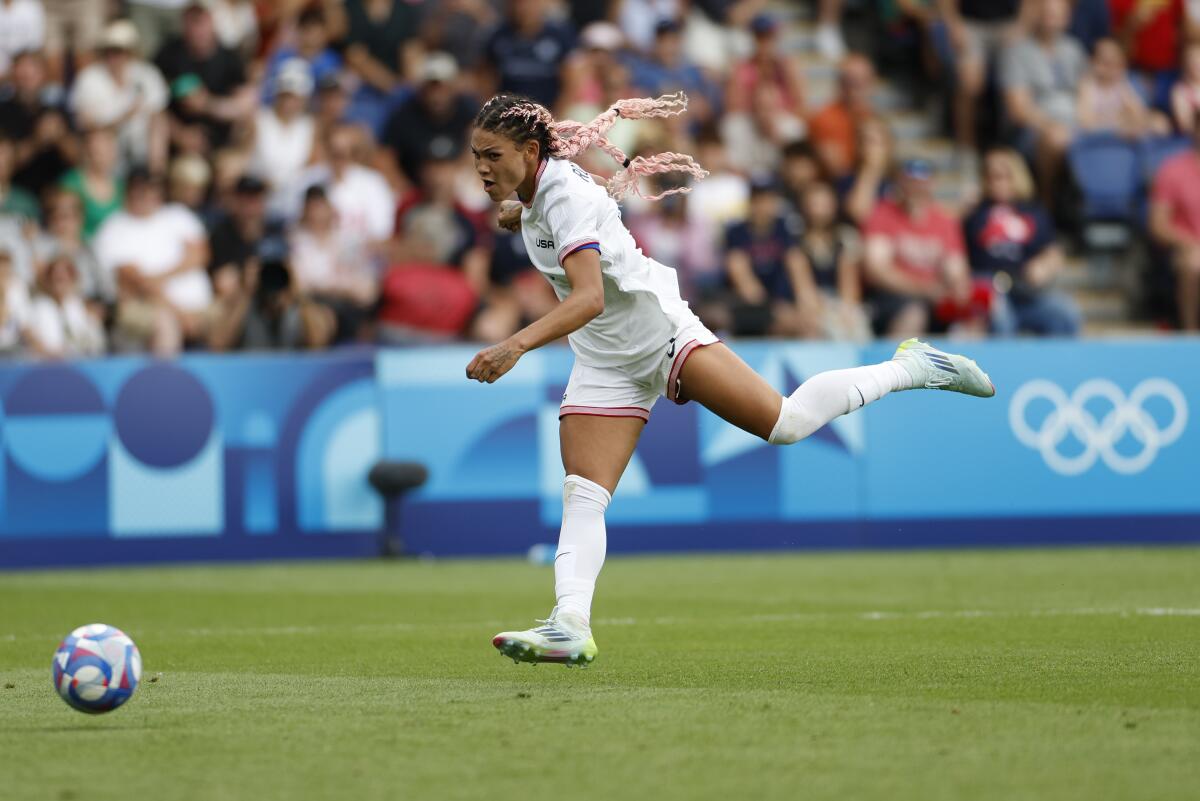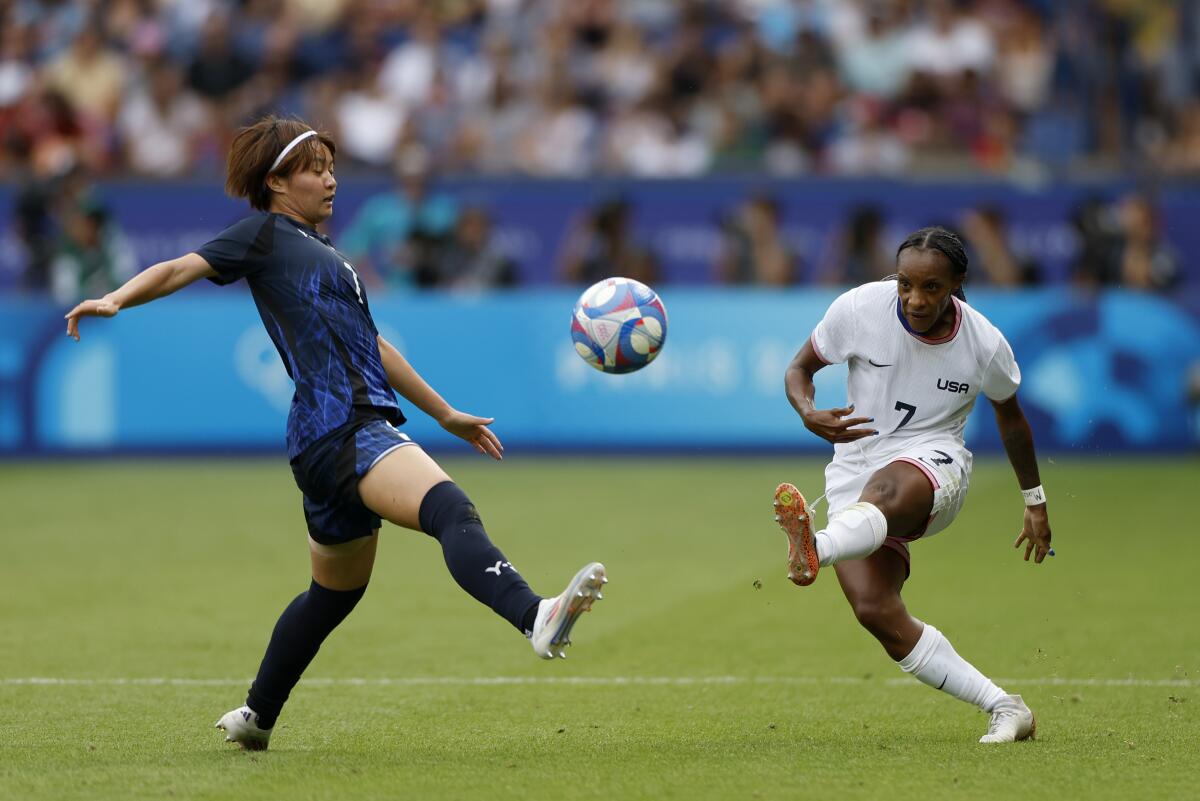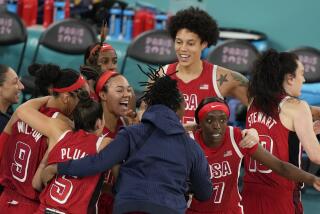Trinity Rodman’s stellar goal in extra time lifts U.S. into Olympic semifinals

PARIS — The last time the U.S. women competed in the knockout rounds of a major international soccer tournament, they played 120 scoreless minutes before losing in penalty kicks.
As the time ticked away without a goal in Saturday’s Paris Olympics quarterfinal, it looked as if their fate would again be decided in the same cruel way.
Then winger Crystal Dunn took the ball near midfield, spotted Trinity Rodman beginning a run far up the right side, and dropped a magnificent diagonal pass softly on Rodman’s right instep. Rodman did the rest, cutting back to evade a defender before curling a left-footed shot into the top corner to beat both the clock and Japan, 1-0 in extra time, before a crowd of 43,004 at Parc des Princes stadium.
Certainly that put to bed the painful, bitter memories of last summer’s penalty-kick loss to Sweden, which ended the shortest World Cup in national team history, led to the dismissal of coach Vlakto Andonovski and started the long-delayed makeover of an aging U.S. roster.
“We’ve moved on from the World Cup,” forward Sophia Smith said in a cold voice that suggested they hadn’t moved on at all.
They may have now. And that deliverance comes courtesy of Rodman, who has scored the go-ahead goal in three of the Americans’ four games in France. The most memorable was Saturday’s game-winner, even if Rodman doesn’t remember all of it.

“I, like, kind of blacked out,” she said. “That’s, like, the best moment in my career.”
For her teammates, however, the highlight-reel goals are beginning to become commonplace, even as they remain breathtaking.
“It was an insane goal,” midfielder Korbin Albert said. “But we see that every day in practice with Trin.”
Rodman’s talent has been obvious from the time she started playing soccer in Orange County at age 4. In grade school she began plotting a professional career, a dream that came true at 18 when the Washington Spirit took her with the second pick in the 2021 NWSL draft, making her the then-youngest player ever selected.
A year later the Spirit gave her the league’s first million-dollar contract, a four-year deal reportedly worth $1.124 million. And after tying for second on the national team with five goals in 18 appearances last year, Rodman has blossomed under new coach Emma Hayes, who took over in June.
“She’s had a lot more games under her belt since the World Cup, obviously,” said Dunn, whose 153 international caps rank second on the team. “It speaks to her discipline as a player and just wanting to always get better. She is so humble. She’s always asking questions. It’s incredible to watch.
“In this tournament you see a lot of players growing and just trusting the process and getting the job done.”
Rodman, 22, said the credit for that goes to Hayes and the freedom and confidence she gives to each player.
“Emma’s just obviously really intelligent and she wants us to thrive the way that we always have,” Rodman added. “That’s something that she embeds in the way that she coaches. She doesn’t want to change anybody’s style. She wants everyone to be creative in their own ways and she lets that happen while also trying to put her structure and her principles sprinkled in there.
“Allowing us to play free has been extremely successful.”
The U.S. men get out of the group stage and look to reach the semifinals for the first time. The U.S. women’s team is looking to end a gold-medal drought.
Playing free wasn’t something the U.S. had much success with Saturday. Japan plays a low block better than any team in the world and though it ceded possession to the potent U.S., its back line, which stretched from one touch line to the other, allowed the Americans just two harmless shots on goal through the first 105 minutes.
“We kind of knew that it was going to come down to something brilliant,” Rodman said.
That came two minutes into stoppage time of the first 15-minute extra period. And it started with Dunn.
“I take a touch inside and I see Trin and I was like, ‘you know what? If Trin can kind of go one v. one in this situation, then I trust her at least,‘ ” said Dunn, whose 50-yard pass caught Rodman onside by inches. “She is so young, so fierce. It’s that trust and belief that she’s going to get the job done at the end.
“We all believe in every single person on the field. And I think it speaks to this team just trusting and believing the process.”
Rodman’s goal, which made her the youngest U.S. women to score in an Olympic knockout match in 20 years, sends the U.S. on to Lyon for Tuesday’s semifinal against Germany, which eliminated defending Olympic champion Canada on penalty kicks in its quarterfinal. It will be the team’s fifth hot and humid game in four cities in an exhausting13 days, and the women are hoping it won’t be the end of their Olympic road. There’s a final to be played next weekend.

The U.S. made that gold-medal match in four of the first five women’s Olympic tournaments, winning it four times, but hasn’t been back since 2012, falling in the quarterfinals eight years ago in Brazil and losing to Canada in the semifinals three years ago in Japan.
“We have two games left. We have nothing to save it for,” Smith said. “So we’re going to give everything that we have, empty the tank. I know we have a lot left.”
They also have Rodman. And that may be all they need.
More to Read
Go beyond the scoreboard
Get the latest on L.A.'s teams in the daily Sports Report newsletter.
You may occasionally receive promotional content from the Los Angeles Times.








